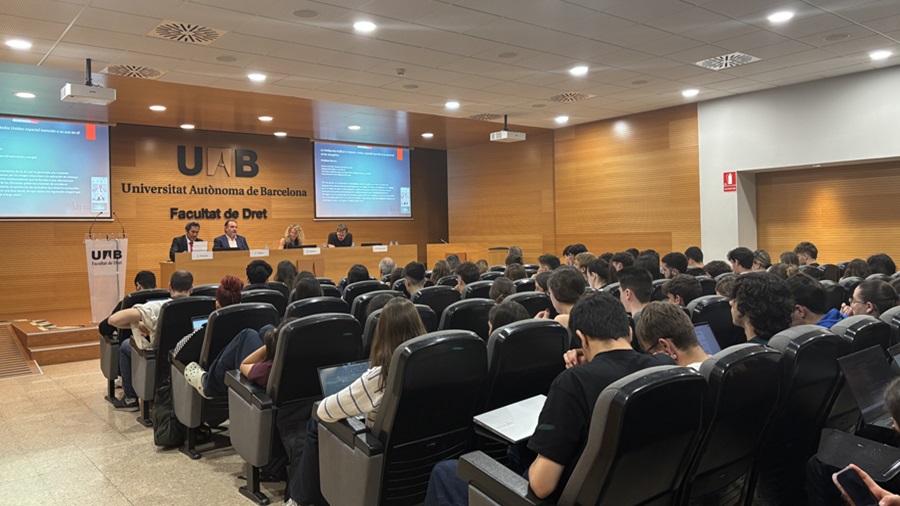Experts analyse the challenges AI poses on the energetic sector
The Faculty of Law of the UAB hosted the conference "The challenges of the energy sector in the face of the development of AI", on Wednesday 21 May, an initiative organised by the Manuel Ballbé Chair, the Global Legal Area and the Universitat Autònoma de Barcelona. The event brought together leading voices from the academic and legal world such as Dr Carlos Padrós Reig, Dr Roser Martínez Quirante, Dr Antonio Morales Plaza, and Dr Joaquín David Rodríguez Álvarez.

The conference addressed the need for robust governance in companies and the adaptation of their structures in the face of the irruption of AI.
The exponential growth of global energy demand driven by General Artificial Intelligence and new regulatory challenges marked the debate.
The conference addressed some of the most pressing challenges posed by the emergence of artificial intelligence in strategic sectors. One of the central themes was the impact of Artificial General Intelligence (AGI) on global energy demand.
The growing competition between the United States and China to lead the development of this technology is causing an exponential increase in energy consumption, compromising the sustainability of the global electricity system and climate commitments. This also has an impact on the different regulatory strategies at both the European and national level (within EU countries), and finally compared to the United States and other major powers that are currently unregulated.
Antonio Morales stated that “AI in the US consumes 3% of energy today and this figure will reach 8% by 2030”. This means that “continuing with the energy transition is crucial to meet the energy needs of AI,” concluded Joaquín Rodríguez. He also pointed out that “most of the infrastructures we have today were created for a climate era that no longer exists and therefore investment in network and distribution infrastructures is of vital importance”.
The speakers highlighted the need to renew infrastructures, accelerate the transition to renewable sources, and improve the efficiency of data centres as an urgent priority for governments and companies. In parallel, the importance of strong governance structures and an organisational model with well-defined roles and responsibilities for integrating AI in large corporations was underlined. The use of artificial intelligence impacts the management of corporations, especially from the point of view of the duties and responsibilities of directors.
Firstly, they emphasised the crucial role played by boards of directors in defining strategies and supervisory frameworks with the definition of the principles of responsible use of AI - respect for human beings, non-discrimination, proportionality - set out in the European regulation. They also pointed out the great importance of second-level governance in risk management and more specific controls, with the inventory register of the different AI systems, use cases, testing and assessment, deployment and monitoring.
In addition, they explained that in the face of a technology that can improve decision-making, but also entails risks such as algorithmic opacity, excessive dependence or bias in the data, the experts insisted that administrators must exercise effective control, guaranteeing both regulatory compliance and an adequate reserve of human judgment. In this sense, Francisco Javier Arias stressed the “need to approve policies that regulate decision algorithms in capital companies”.
Finally, the speakers pointed out the public administration area, where implementing algorithmic systems must combine efficiency with legal guarantees. The conference also served to stress on the need to maintain human interventions when it comes to decisions in which fundamental rights are involved, reinforcing the principle of account rendering in all automated processes.
Carlos Padrós concluded his speech by adding that “a new law in which the rendering of accounts and intelligent networks are regulated will be fundamental”.
The Manuel Ballbé Chair was created to provide continuity to the work and thoughts of UAB Professor Manuel Ballbé, whose legacy represents a huge contribution to global regulation in the area of Human Security.